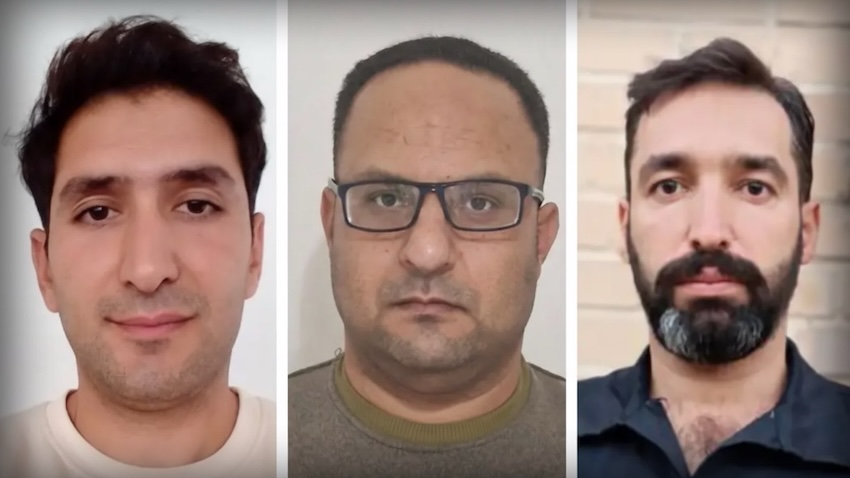Tehran: Confessions, torture and prison. New sentences for Christian converts
A court has upheld decades of prison sentences for five defendants. Their ‘crime’ was participating in house church services, taking online courses on faith and attending training courses abroad (Turkey). On 7 October, another trial for blasphemy. In August, state television broadcast a propaganda documentary featuring forced confessions by converts.
Tehran (AsiaNews) - Confessions extracted by force through extensive use of torture, prison sentences in the first instance and others confirmed on appeal with sentences of up to 10 years in prison, with the sole ‘crime’ of professing their faith or converting from Islam.
Christians in Iran are once again in the crosshairs of the judiciary and the authorities, with a crackdown targeting mainly adult converts on trumped-up charges such as undermining the integrity of the state and being in the pay of foreign powers. This form of religious persecution has been going on for some time and has made the Islamic Republic one of the countries most at risk in terms of religious freedom.
On 17 September, Section 36 of the Tehran Court of Appeal upheld the sentences of a total of more than 41 years' imprisonment for five Iranians who converted to Christianity. Human Rights Activists News Agency reports that Hessamuddin Mohammad Junaidi, Abolfazl Ahmadzadeh-Khajani and two other defendants who requested anonymity will each serve eight years and one month in prison.
The fifth, Morteza Faghanpour Saasi, was sentenced to eight years and 11 months, including seven years and six months for ‘deviant educational and proselytising activities contrary to and harmful to Islamic law (sharia) in relation to contacts with foreign countries’, seven months for propaganda against the regime and 17 months for insulting the Supreme Leader.
The other four defendants received seven years and six months for proselytising plus seven months for propaganda against the regime. Section 1 of the Varamin Revolutionary Court issued the initial sentence on 16 July.
The charges were based on alleged illegal distribution of Christian religious books, participation in online faith training programmes abroad, and publication of a caricature of Ali Khamenei on social media. Added to this is a further charge of contempt, with a hearing set for 7 October at Section 104 of the Second Criminal Court of Varamin.
The charges against the Christians, brought under the notorious Articles 500 bis, 500 and 514 of the Islamic Penal Code, related to their participation in Christian training courses in Turkey, attendance at house church meetings and other online activities.
One of the five convicted men, Faghanpour Saasi, who was arrested in June and transferred to Evin, was subjected to particularly harsh treatment: his home was searched, his books and religious images were confiscated, his mobile phone was seized, and he was subjected to violence in prison during his months of pre-trial detention.
Morteza was arrested at his workplace on 12 June, after which officers raided his home and confiscated his personal belongings, including his Bible. The charges of propaganda against him related to his alleged “illegal” distribution of Christian books and his participation in online courses and services.
According to sources at Article 18, he was tortured and abused during the 20 days he spent in Section 209 of Evin Prison in Tehran, a ward under the jurisdiction of the Ministry of Intelligence.
The Islamic Republic is ranked ninth worst in the world for Christian persecution on Open Doors International's World Watch List. Although Tehran recognises some historical communities such as Armenians and Chaldeans, believers are often treated as second-class citizens and affected by discriminatory policies.
They are forbidden to preach the Gospel or own a Bible in the Persian language, while the majority of the population consists of converts from Islam who face the worst consequences of repression. They are seen as apostates and treated as a threat to the Islamic government's control over the people. Ministers of religion have been arrested and charged with “crimes against national security”.
In some cases, persecution also turns into a kind of public pillory: last August, in fact, the evening news on state television broadcast forced confessions by Christian converts in a kind of propaganda documentary reporting security-related accusations, part of a campaign of fabricated cases and pressure.
The report, produced with the participation of Ameneh Sadat Zabihpour, a well-known figure in the Islamic Republic of Iran Broadcasting (IRIB) linked to the security agencies, brands converts as ‘evangelists’ linked to foreign entities, collaborators and a threat to security.







.png)










